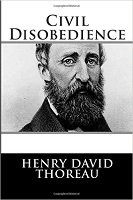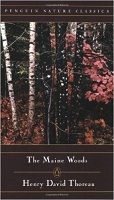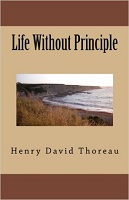Henry David Thoreau published two books and numerous essays during his lifetime and many more of his works were published after his death in 1862.
Deciding on which of these Thoreau books or essays you should read really depends on what type of Thoreau writing is your favorite.
If you are more of a fan of his political writing, then his essays and books such as Civil Disobedience, Slavery in Massachusetts and John Brown are probably more your style.
If you are more drawn to his nature and philosophical writing, then Walden, Walking, Wild Apples, Cape Cod would be a better option for you.
If you haven’t read much of Thoreau’s work and don’t know what type of his writing you prefer, here is a general overview of his best essays and books:
(Disclaimer: This post contains Amazon affiliate links. As an Amazon Associate I earn from qualifying purchases.)
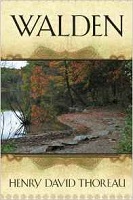 1. Walden, or, Life in the Woods
1. Walden, or, Life in the Woods
Published in 1854, Walden is Thoreau’s most famous book and many would argue is his best. The book is about the virtues of simple living and self-sufficiency in a modern world and was inspired by the two years Thoreau spent living in a small cabin at the edge of Walden Pond in the 1840s.
The book is a complex work that is part memoir, part sermon, part manifesto and, at its heart, is about how to live a full and meaningful life amid a world full of drudgery and meaningless distractions.
Walden was moderately successful when it was published, but took five years to sell 2,000 copies. It then went out of print until Thoreau’s death in 1862. It has since become an American classic.
The book received a number of favorable reviews when it was originally published in 1854, though its unique perspective and subject matter perplexed many reviewers.
The Boston Commonwealth found it thought-provoking and delightful:
“We mean, before long, to say how delightful a book this is but it is now Saturday, the very day when people buy books, and we can only say that it is just the pleasantest and most readable, the most-thought-provoking book of the present season. It is a better work than the author’s previous one, ‘A Week on the Concord and Merrimack Rivers,’ though we reckon that as a book which will live in American literature a good while.”
The Saturday Evening Post declared it strange but interesting:
“We have, now and then, in this jostling, civilized world, an unmistakable human oddity, and the author of this strange, but interesting book, is one of that class…Nevertheless, his ‘Life in the Woods’ is a most fascinating book.”
The Boston Herald deemed the book “a readable and interesting one” while the New York Times declared Thoreau a genius but also wrote the book off as selfish:
“The author of this book – Mr Henry D. Thoreau – is undoubtedly a man of genius. It is not possible to open twenty pages without finding plentiful indications of that fact. Unfortunately, however, he is an erratic genius, thoroughly impracticable, and apt to confuse rather than arrange the order of things, mental and physical…Mr. Thoreau is a good writer, possessed of great comic powers, and able to describe accurately many peculiar phases of nature. But the present work will fail to satisfy any class of readers. The literary man may be pleased with the style, but he will surely lament the selfish animus of the book.”
As beloved as the book is, modern readers still sometimes struggle with the old-fashioned prose as well as the overall message of the book, as can be seen from the handful of reader reviews on Goodreads and Amazon criticizing it as judgemental, elitist and hard to read.
Nonetheless, some readers who said they initially struggled with the book eventually came to understand and enjoy it, as one reviewer on Goodreads explained:
“The concluding chapter, to an extent, rewarded me for my persistence and toil. In this final chapter, he comes back to the real purpose of the book: to drill home a simple idea – ‘I learned this, at least, by my experiment; that if one advances confidently in the direction of his dreams, and endeavors to live the life which he has imagined, he will meet with a success unexpected in common hours. He will put some things behind, will pass an invisible boundary; new, universal, and more liberal laws will begin to establish themselves around and within him; or the old laws will be expanded, and interpreted in his favor in a more liberal sense, and he will live with the license of a higher order of beings.’ This I think was the core philosophy of the book – if you pursue the ideal direction/vision you have of how your life should be, and not how convention dictates it should be, then you will find success and satisfaction on a scale unimaginable through those conventional routes or to those conventional minds.”
Published in 1849, under its original title of Resistance to Civil Government, this essay advocates resistance to unjust laws and governments and was inspired by Thoreau’s experience of being arrested and jailed for refusing to pay his poll tax because he believed it was being used to fund the Mexican-American war, which he opposed.
As activist and historian Howard Zinn explained in the introduction to the book The Higher Law: Thoreau on Civil Disobedience and Reform, which is a collection of Thoreau’s political essays including Civil Disobedience, Thoreau was addressing important questions in these essays about how to do the right thing in an unjust world:
“You will find in this volume (published previously in hardcover as Reform Papers) what are usually called the ‘political writings’ of Thoreau. Indeed, he is dealing here with the incendiary issues of his time: the Mexican War, the Fugitive Slave Act, the execution of John Brown. The term ‘political,’ however, does not do justice to the breadth and depth of Thoreau’s ideas. He looks beyond the immediate subjects of contention to ask the fundamental questions pondered before and after his time by the world’s great thinkers: Plato, Machiavelli, Hobbes, Locke, Rousseau, Marx, Tolstoy. That is, he addresses the obligations of the citizen to government, of law to justice, of human beings to one another. In this collection, he does something more–he asks the most troubling question of human existence: how shall we live our lives in a society that makes being human more and more difficult?”
In the 20th century, many activists of the time cited the book as a major influence on their own ideas and activism, particularly Indian independence leader Mahatma Gandi and civil rights leader Martin Luther King, Jr:
“My first introduction to Thoreau’s writing was, I think, in 1907, or later, when I was in the thick of the passive resistance struggle. A friend sent me an essay on ‘Civil Disobedience.’ It left a deep impression on me.” – Mahatma Gandi
“I became convinced that what we were preparing to do in Montgomery [Montgomery Bus Boycott of 1955] was related to what Thoreau had expressed. We were simply saying to the white community, ‘We can no longer lend our cooperation to an evil system.’” – Martin Luther King, Jr
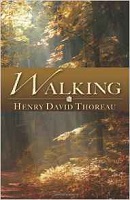 3. Walking
3. Walking
Published posthumously in the Atlantic Monthly Magazine one month after Thoreau’s death in 1862, this essay is about the art of taking a walk and how it allows you to better explore and appreciate nature, which, Thoreau argues, humans are not separate from but are a part of, as he explains in the opening line of the essay:
“I wish to speak a word for Nature, for absolute freedom and wildness, as contrasted with a freedom and culture merely civil – to regard man as an inhabitant, or a part and parcel of Nature, rather than a member of society.”
An article in Slate Magazine, titled Walking Home from Walden, argues that Walking is a precursor or perhaps even a companion piece to Walden:
“If you understand ‘Walking,’ you can almost skip Walden. (I’m not really recommending that—in fact, please don’t.) What I mean is this: It’s clear that ‘Walking,’ and the actual walking that inspired it, leads to Walden. Within a year of delivering the ‘Walking’ lecture for the first time, in the spring of 1851, Thoreau was back at his draft of the big book, revising and expanding with renewed creative energy. You could almost say Thoreau ‘walked’ to Walden. And yet if ‘Walking’ is a sermon, then Walden is something more like prophecy—its author the Reformer and child of wildness, divine messenger, sent to save the town. ”
Thoreau himself seems to have agreed with this sentiment when he scribbled on the title page of a draft of the essay in 1852: “I regard this as a sort of introduction to all that I may write hereafter.”
Published posthumously in 1864, the book chronicles three separate trips Thoreau took to the woods of Maine in the 1840s and 1850s.
It consists primarily of a series of articles previously published in the Atlantic Monthly Magazine in 1858, as well as some unpublished material, that describe the Maine landscape and identify the types of trees, plants and animals of the area while also weaving in a bit of philosophy from time to time.
In the introduction to the 1983 Princeton University Press edition of the book, Paul Theroux explains that since the book was published after Thoreau’s death, it is a bit unfinished but, although it is not exactly a cohesive work, it is still an excellent read:
“The Maine Woods published posthumously is a set of three narratives in various states of completion; not a unified book, but rather a three-decker sandwich of woodland excursions. As a record of impressions, a work in progress, it is all the more interesting. ‘Ktaadn’ is a polished and youthful piece, ‘Chesuncook’ finished and mature, and ‘The Allegash and East Branch’ somewhat provisional though containing a wealth of information.”
The New York Times recently described it, in an article about retracing Thoreau’s Maine trips, as “an insightful reporter’s picture of a rugged wilderness the moment before being irrevocably altered by armies of loggers.”
Reviewers on Amazon describe the book as more of a travel story than a manifesto like Walden, as one Amazon reviewer said: “Do not read this and compare it to Walden or as a some window into Thoreau, but for sheer joy of kicking off the canoe at Telos and the wonder of the north country.”
 5. Cape Cod
5. Cape Cod
Published posthumously in 1865, this book is similar to Thoreau’s other book The Maine Woods because it is about three separate trips that Thoreau took to Cape Cod in the 1840s and 1850s.
It consists primarily of a series of articles previously published in Putnam Magazine in 1855 that describe the natural beauty of Cape Cod and suggests that a trip to the beach, like many journeys into the wilderness, can be a spiritual journey.
According to an article titled At the Threshold of Chaos: Henry Thoreau on Cape Cod, on the Thoreau Society website, the book suggests that the beach is the place to go if you want to think and be inspired:
“At the center of Cape Cod is an idea of the beach as a threshold of creative energy: ‘The sea-shore is a sort of neutral ground, a most advantageous point from which to contemplate this world’…A man may stand there and put all America behind him.”
Also present in the text are some of Thoreau’s most fundamental beliefs, such as his belief, which is also present in Walden, that one should seek spiritual wealth instead of material wealth. This can be seen when Thoreau describes watching a sloop in Chatham dragging the sea bed for lost ship anchors:
“But that is not treasure for us which another man has lost; rather it is for us to seek what no other man has found or can find,—not be Chatham men, dragging for anchors.”
The Walden Woods Project published a statement in the Cape Cod: Illustrated Edition of the American Classic, explaining that Thoreau’s Cape Cod is a mix philosophy, nature worship and travel adventure:
“Yet, like any Thoreauvian excursion, Cape Cod is anything but a simple travel narrative. It encompasses all the Thoreaus we have come to expect: the saunterer, the reformer, the social critic, the natural philosopher, and the father of the American environmental movement.”
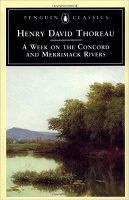 6. A Week on the Concord and Merrimack Rivers
6. A Week on the Concord and Merrimack Rivers
Published in 1849, the book is about a camping trip to the White Mountains that Thoreau took with his brother John in 1839.
After John Thoreau died of tetanus in 1842, Thoreau decided to publish the book as a tribute to him and worked on the early drafts of the book while living at Walden Pond from 1845 to 1847.
Thoreau paid for the publishing costs of the book himself. Unfortunately, the book didn’t sell well and the publisher, James Munroe and Company, returned the remaining 700 copies to Thoreau. In a letter to a friend, Thoreau said: “I have now a library of nearly nine hundred volumes, over seven hundred of which I wrote myself.”
According to the introduction of the Princeton University Press edition of the book, John McPhee states that the book didn’t sell well because Thoreau’s unorthodox style was too ahead of its time and, since it was Thoreau’s first book, readers were unfamiliar with who Thoreau was as a writer. McPhee explains that modern readers appreciate the book more because they know and understand Thoreau’s work better:
“The book’s heterodoxy and apparent formlessness troubled its contemporary audience. Modern readers, however, have come to see it as an appropriate predecessor to Walden, with Thoreau’s story of a river journey depicting the early years of his spiritual and artistic growth.”
An article on the Thoreau Society website, titled Life and Legacy, explains that readers at the time also found the book to be problematic because it had a “looseness of structure and a preaching tone unalleviated by humor, that had put readers off.” These issues actually prompted Thoreau to hold off on publishing Walden so he could revise it and avoid these problems.
Modern readers don’t seem to have an issue with the structure or tone of the book and feel that if there is a problem, it lies in the reader and not the book, as one Amazon reviewer said:
“It is obscene that abridged versions of this book are for sale. ‘A Week…’ is an artistic masterpiece. If it seems a bit dense right now, then put the book on your shelf for a few decades and hope that you, not the book, will improve over time.”
Published posthumously in 1863, the book discusses ethical principles for living a righteous life. It argues that working solely for money will morally bankrupt you and that you should instead do a job because you love the work, as Thoreau explains:
“The ways by which you may get your money almost without exception lead downward. If you traded in messages from heaven, the whole curse of business would attach to it. To have done anything by which you earned money merely is to have been truly idle or worse. If the laborer gets no more than the wages his employer pays him, he is cheated, he cheats himself.”
The book was based on an essay in 1856, alternatively titled Getting a Living and What Shall It Profit?, that Thoreau later revised and edited for publication but died before being able to do so. It was finally published in 1863 in the Atlantic Monthly Magazine.
According to the book Reimaging Thoreau by Robert Midler, Life Without Principle is a bold essay that challenges readers to re-evaluate their lives and take stock of what’s really important:
“’Getting a Living’ (as revised in ‘Life Without Principle’) is his most abrasive literary performance, resuming the critique of materialism in ‘Economy’ but converting its reformist stance into a moralism calculated to affront his readers and drive a wedge between his own principled but (financially) ‘profitless’ life and their truly profitless lives.”
Many reviewers on Goodreads describe the essay as insightful and thought-provoking and praise the essay’s anti-consumer and anti-materialistic message, as one reviewer said:
“If an apple a day keeps the doctor away, then a daily page of Thoreau or Emerson will flush the consumer out of your system.”
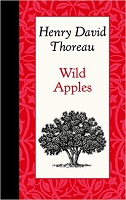 8. Wild Apples
8. Wild Apples
Published posthumously in the Atlantic Monthly Magazine six months after Thoreau’s death in 1862, this essay discusses the history of the apple and how it came to grow and evolve over time.
The essay is based on a lecture of the same name that Thoreau delivered at the Bedford Lyceum on February 14, 1860.
An article on the website MappingThoreauCountry.org points out that the essay is more than a simple history of fruit and is actually a transcendental lesson about learning and knowledge:
“In narrating the apple tree’s valiant resistance to its enemies and the enterprising methods it used to insinuate itself across the country, Thoreau was not so much anthropomorphizing evolution as he was implying that our direct experience of natural phenomena informs our understanding, which includes but is not limited to facts alone.”
While many of the book’s reader reviews on Amazon seem to have missed the point of the book and state that it’s just a simple book about apples, one reviewer, who titled their review “Not Just About Apples,” picked up on the subtext of the essay:
“While this was an interesting dissertation about apples, it was also about the settling of the New World. Comparing Thoreau’s time with our own, we seem to have lost our spirit of adventure. We seem to have lost our ‘wildness’ so to speak. We have become tribal and no longer have the self reliance that Thoreau and Emerson valued.”
Another Amazon reviewer noted that the book was a “story of overlooked beauty” and enjoyed the inspiring message of the essay:
“While the title is “Wild Apples” and the text describes Thoreau’s love of and experience with the various wild apple trees he “discovered” the story could be about tenaciousness, flexibility and resolve; making something worthwhile from poor circumstances and despite expectations and appearances.”
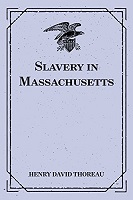 9. Slavery in Massachusetts
9. Slavery in Massachusetts
Published in 1854 in the Liberator Magazine, this essay is based on a speech that Thoreau gave at an anti-slavery rally in Framingham, Massachusetts in July of 1854 after the re-enslavement of fugitive slave Anthony Burns in Boston, Massachusetts.
The essay expands on the ideas in Civil Disobedience and attacks the state of Massachusetts for complying with the Fugitive Slave Act, according to an article on the PoetryFoundation.org:
“His attack is now not merely on slavery in general but on his own state’s complicity with an immoral law. Thoreau retains his Transcendentalist plea that one trust one’s inner conscience to judge the state’s actions, but he moves much closer to advocating the destruction of a state that engages in practices such as slavery.”
The essay is considered a part of Thoreau’s “political writings” and since it explores concepts such as morals, ethics and laws, it is similar in nature to his other essay Civil Disobedience.
Since slavery was abolished over 150 years ago, the subject matter may be seem out of date, but as one reviewer on Goodreads points out, the essay’s message about politics in general make it as relevant as ever:
“Master of rhetoric. This essay contains criticism of American government and press that is still relevant today. My favorite quote is, ‘if the majority in congress were to vote the devil to be God. . . the minority must then wait and comply until a later date to reinstate God.’”
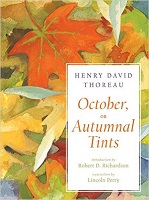 10. October, or Autumnal Tints
10. October, or Autumnal Tints
Published posthumously in the Atlantic Monthly Magazine in 1862, this essay was based on a lecture that Thoreau delivered at Frazier Hall in Lynn in 1859. The essay is about nature in autumn and reflects on the changes that occur during this time.
A recent article in the Atlantic Monthly Magazine describes Autumnal Tints as “a naturalist’s guide to truly seeing nature” and argues that the essay reflects on Autumn as a time of renewal instead of a time of death:
“Instead of viewing autumn as a time of death and decay, Thoreau came to see and celebrate the season (and death itself) as nature’s own way of renewing life. He believed that if we could see properly, even fallen leaves on the ground could ‘teach us how to die.'”
Thoreau revised the essay while he was dying of tuberculosis and one reviewer on Goodreads noted the symbolism of the text in the context of Thoreau’s own impending death:
“For Thoreau, an autumn leaf is not just an autumn leaf. Rather, it is a symbol that helps him confront the idea of his own death with the hope that he would live on in some way, much as the dying leaves of fall go on to be a part of future forests.”
Sources:
Midler, Robert. Reimagining Thoreau. Cambridge University Press, 1995.
Princeton Alumni Weekly. Vol. 69, 1968.
Berger, Michael Benjamin. Thoreau’s Late Career and The Dispersion of Seeds. Camden House, 2000.
Thoreau, Henry David. Cape Cod: Illustrated Edition of the American Classic. Houghton Mifflin Company, 2008.
Dean, Bradley P. and Gary Scharnhorst. “The Contemporary Reception of Walden.” Studies in American Renaissance, 1990, pp: 293-328.
Andriote, John-Manuel. “Revisiting the Splendor of Thoreau’s Autumnal Tints.” Atlantic Monthly Magazine, 1 Nov. 2012, theatlantic.com/entertainment/archive/2012/11/revisiting-the-splendor-of-thoreaus-autumnal-tints-150-years-later/264291/
“Henry David Thoreau.” The Poetry Foundation, poetryfoundation.org/poems-and-poets/poets/detail/henry-david-thoreau
Berman, Paul. “Thoreau Among the Cranberries.” New York Times, New York Times Company, 26 Dec. 1999, nytimes.com/books/99/12/26/reviews/991226.26bermant.html
“Bedord.” Mapping Thoreau Country. mappingthoreaucountry.org/itineraries/bedford/
Thoreau, Henry David. “Wild Apples: The History of the Apple.” Atlantic Monthly Magazine, Nov. 1862, theatlantic.com/past/docs/issues/1862nov/186211thoreau.htm
“A Week on the Concord and Merrimack Rivers: With a New Introduction by John McPhee.” Princeton University Press, press.princeton.edu/titles/7720.html
“At the Threshold of Chaos; Henry David Thoreau on Cape Cod by Elizabeth Kalman with Nicholas Holdgate.” Thoreau Society, thoreausociety.org/news-article/threshold-chaos-henry-thoreau-cape-cod-elizabeth-kalman-nicholas-holdgate
Gilsdorf, Ethan. “Tracking Thoreau Through Maine’s Grim and Wild Land.” New York Times, New York Times Company, 19 Sept. 2008, nytimes.com/2008/09/19/travel/escapes/19american.html
Stephenson, West. “Walking Home from Walden.” Slate Magazine, 21 June. 2011, slate.com/articles/arts/culturebox/features/2011/walking_home_from_walden/part_3_the_surprises_that_awaited_me_in_the_works_of_henry_david_thoreau.html
Thoreau, Henry David. “Walking.” Atlantic Monthly Magazine, June 1862,
theatlantic.com/magazine/archive/1862/06/walking/304674/
“The Higher Law: Thoreau on Civil Disobedience and Reform: With an Introduction by Howard Zinn.” Princeton University Press, press.princeton.edu/titles/7719.html
Dean, Bradley P. “Reconstructions of Thoreau’s Early Life Without Principle Lecture.” Studies in American Renaissance, University Press of Virginia, 1987, pp: 285-364, jstor.org/stable/30228137?seq=1#page_scan_tab_contents

